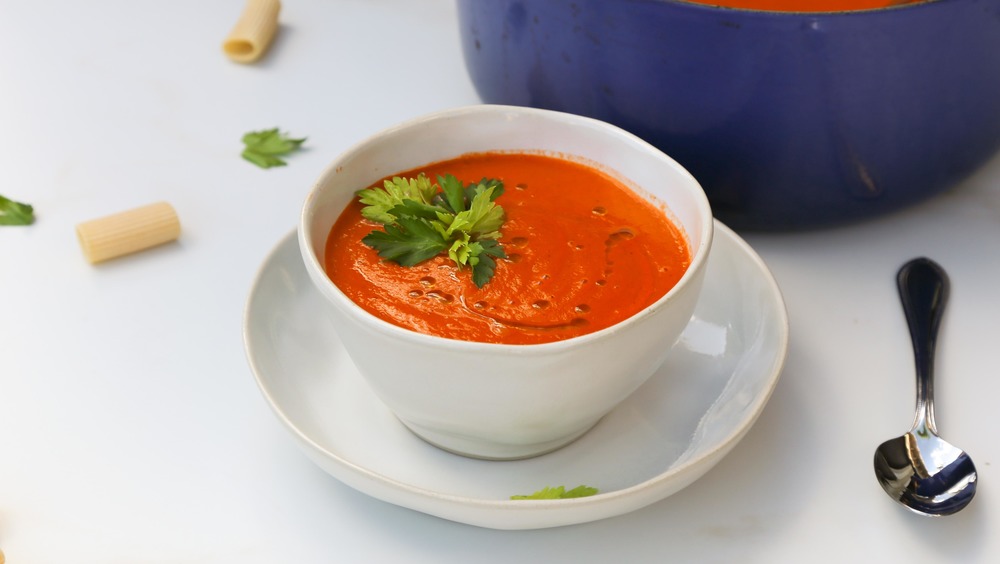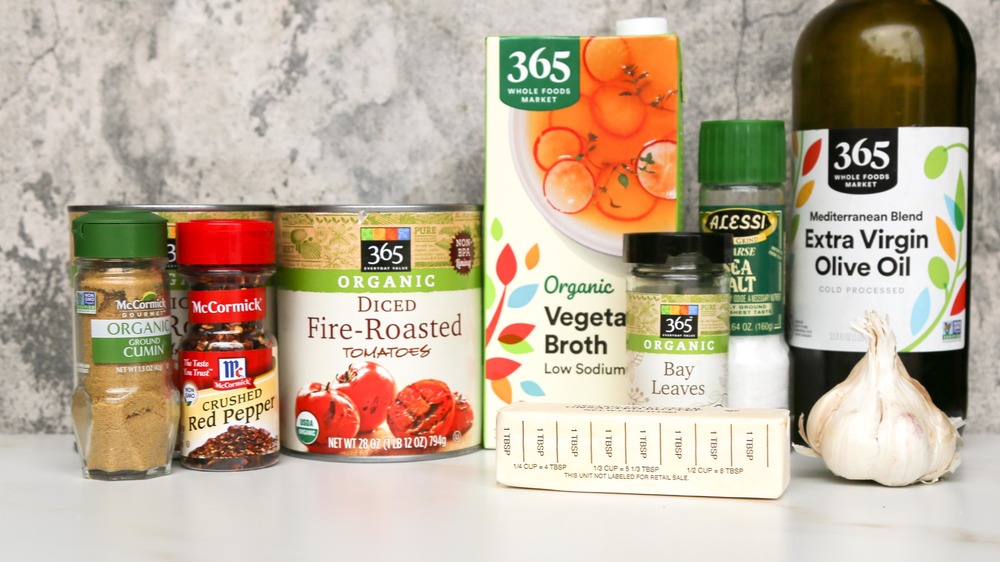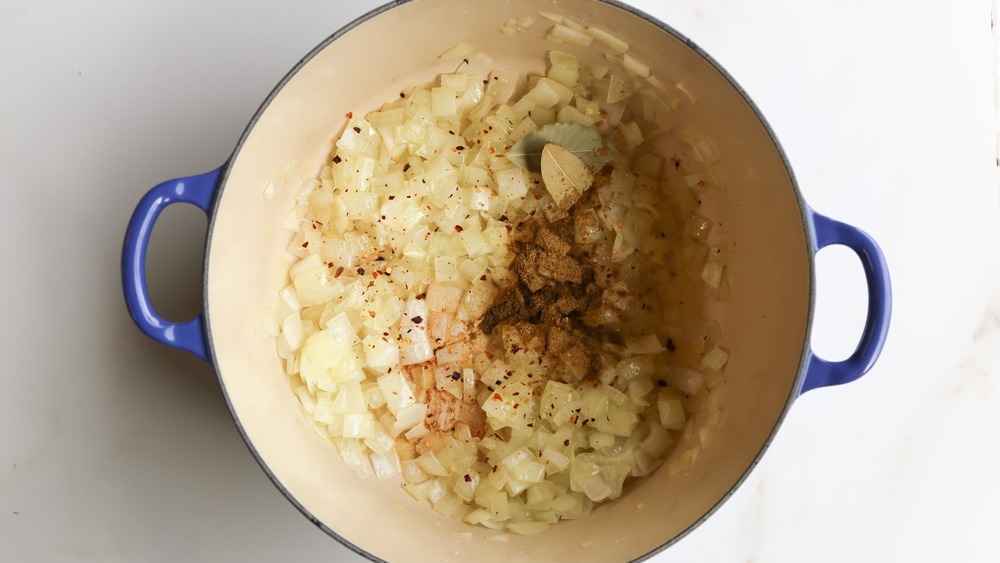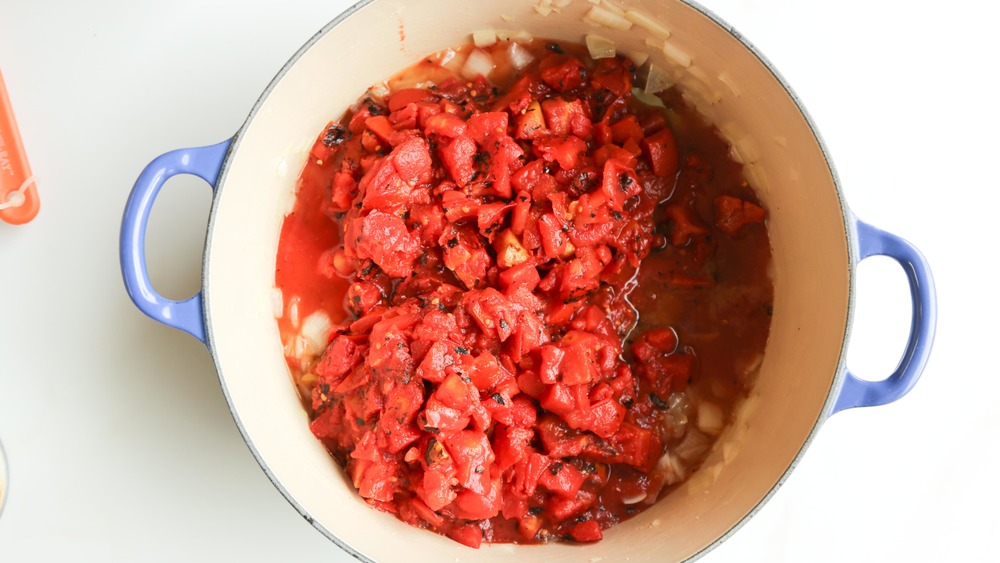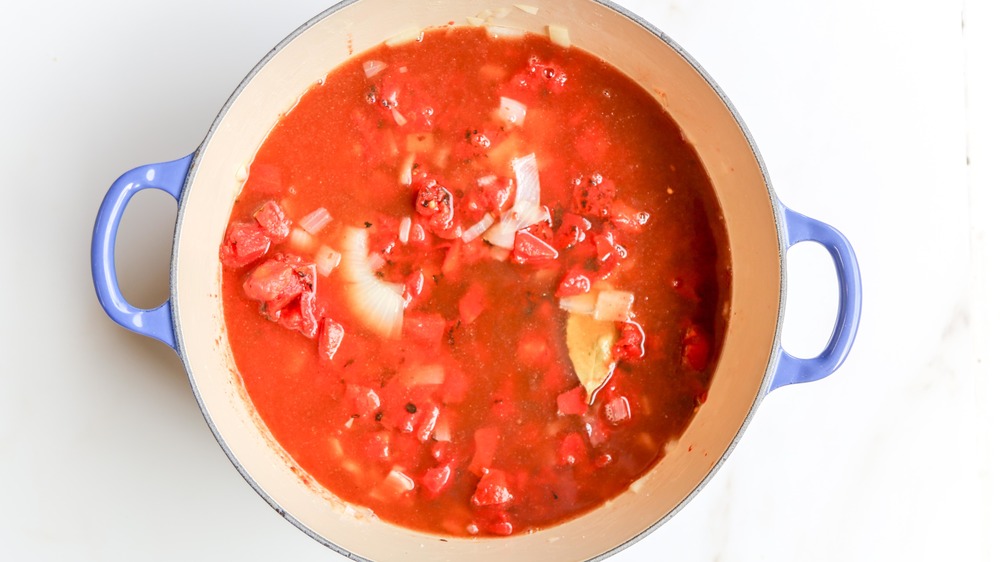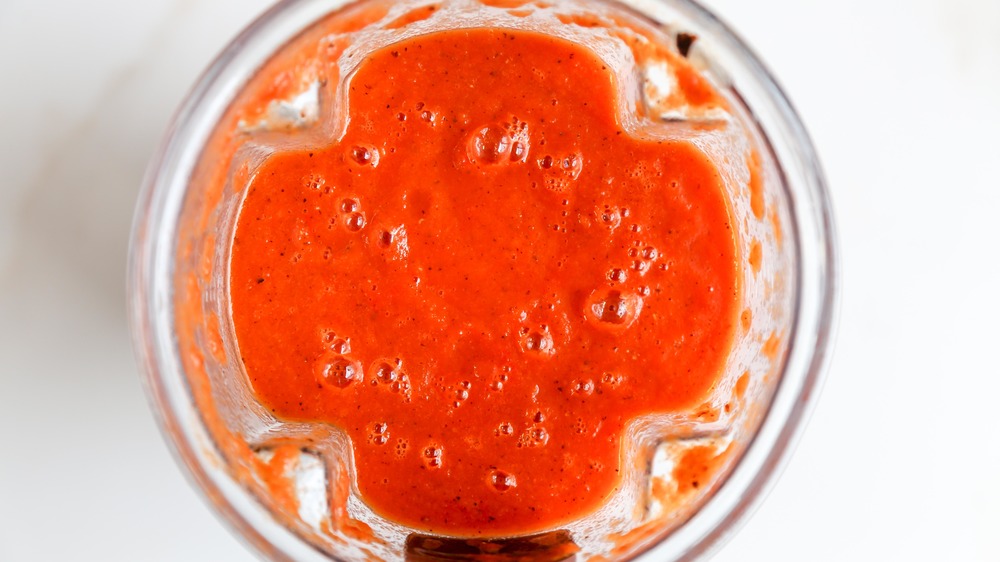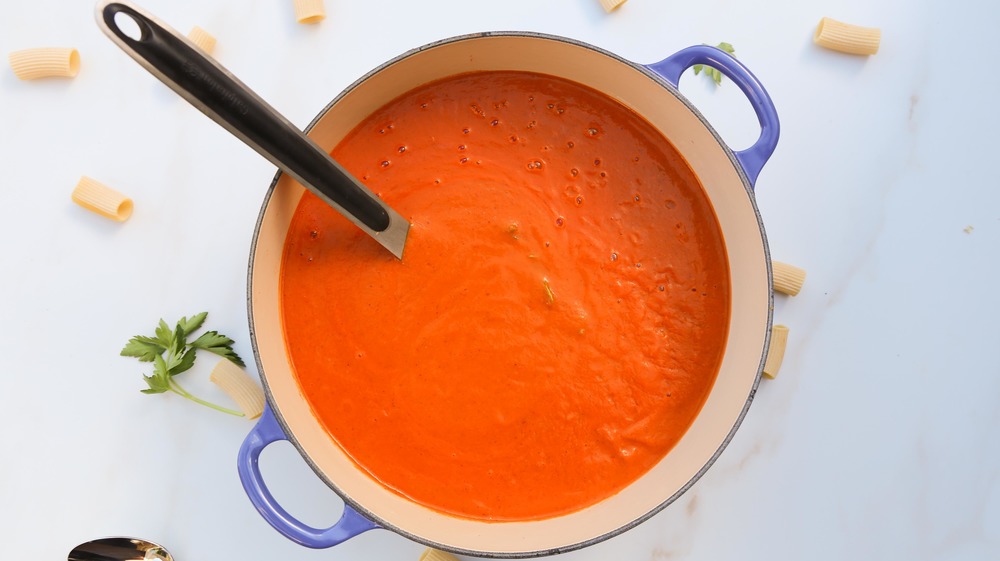Tomato Soup Recipe
Creamy tomato soup is a fantastic winter treat. This tomato soup recipe is very easy to pull off and was created by Maren Epstein, the blogger and recipe developer behind Eating Works. We asked Epstein what inspired this creamy concoction and she told us, "I was inspired to make this recipe by the tomato soup published in the book Jerusalem by Sami Tamimi and Yotam Ottolenghi. The soup was made with fresh tomatoes and bread. It sounded so delicious and simple to make but I wanted to make it without bread."
Before you even ask, yes, this tomato soup would taste excellent with a grilled cheese sandwich on the side. Great minds do indeed think alike. Epstein ensures us, it's a "vibrant" soup with a "strong tomatoey flavor" so, obviously, when you're done cooking and it's piping hot in the bowl, this soup will be begging for you to dip some melted cheese and buttery bread in it.
Gather the tomato soup ingredients
Line up all the ingredients before you start cooking. Luckily, this tomato soup recipe doesn't call for a ton of ingredients. You'll need olive oil; white onions, sea salt, garlic, bay leaves, cumin, chili pepper flakes, fire-roasted tomatoes (make sure you have two 28-ounce cans), vegetable stock, and butter (unsalted is preferable). Keep in mind before you fire up the stove, the garlic will have to be minced and the onions will have to be diced, but not too finely, thicker cuts of onion are fine since you'll eventually be blending this soup. Have your measuring spoons ready to go for divvying up the spices too.
The tablespoon of butter is supposed to be divided and cold when you add it to the soup. So you can cut the amount you need from the stick (then cut that into small pieces) and have that in the fridge for when it's time to incorporate it. Why cold butter? According to Epstein, "Cold butter, when vigorously blended into hot soup, gets cut into the liquid making the soup more creamy. It's a great trick I use to thicken soups without cream."
Sauté the onions, garlic, bay leaves, and spices for the tomato soup
You'll be cooking the bulk of the non-tomato ingredients first. Heat the olive oil in a large Dutch oven over medium-low heat. Next, add the onions and salt. Using a wooden spoon, sauté the onions for about seven minutes, or until they are translucent. It's important to remember to stir them often during this step in order to prevent them from burning. Once the onions are sufficiently translucent, add in the garlic, bay leaves, cumin, and chili pepper flakes. Sauté these ingredients for another minute or so.
A note here: This tomato soup recipe calls for a "pinch" of chili pepper flakes. This can be adjusted per your taste. Add more if you really like to spice things up or add less, or none at all, if you prefer a milder flavor. The amount of chili pepper flakes aka red pepper flakes is really dealer's choice for this particular recipe.
Add the fire-roasted tomatoes for your soup
When the onions, garlic, and spices have all been sautéed to perfection, you'll finally add the heart of this tomato soup, the cans of fire-roasted tomatoes. After you've dumped the cans of tomatoes (no need to drain them first, by the way), into the Dutch oven, cook them (stirring occasionally with the wooden spoon) for about five minutes. Set a timer if you want to be all type-A about it.
One of our first questions to Epstein was, why fire-roasted, and is that kind of tomato absolutely necessary for this soup? You NEVER know when that fire-roasted tomato shortage might come along to up and ruin all our big soup plans, you know? "The tomatoes don't have to be fire-roasted but I think that the fire-roasted tomatoes add more depth of flavor to the soup," she tells us. Nobody's trying to skimp on depth and flavor over here so fire-roasted it is.
Pour in the vegetable stock for the tomato soup
The tomatoes have been cooking with the other ingredients for about five minutes. Now it's time to pour in the stock, which will be the bulk of the liquid in this soup. Add the vegetable stock to the Dutch oven and bring the tomato soup to a boil. Once boiling, reduce the soup to a simmer and cook it partially covered for 15 minutes. Make sure it's actually simmering and not boiling during this period. One stove's simmer is another one's boil, so just factor that in when adjusting the setting on the stove (and you know your stove better than anybody).
Remove the bay leaves at the end of this 15-minute simmer period, before adding the soup to a blender. Bay leaves are cute and all but they aren't in the final rendition of this tomato soup and you probably don't want to eat them (sorry, bay leaves).
Blend the tomato soup in a high speed blender
Now you will transfer the soup from the Dutch oven to a high speed blender, add the butter, and go to town (blend).
Just an FYI if your blender status isn't up to par: "If someone doesn't have a high speed blender they can skip this step," Epstein remarks. "But I would cut the tomatoes and onions into smaller pieces so that the chunky soup is easier to eat. Or they can use an immersion blender."
And does the soup need to cool off from its time on the stove before you add it to the blender? "While I don't do this, it is considered best practice to allow the soup to cool before blending it," Epstein explains. If you don't have that kind of patience (we get it, you're hungry), Epstein suggests you "blend it hot but throw a kitchen towel over the top of the blender to protect from splatters. Just make sure not to turn up the speed too quickly. This could create a vacuum and ultimately cause the soup to explode out of the blender." Ah yes, nothing ruins dinner quite like an unexpected explosion of tomato soup all over the kitchen.
Adjust the tomato soup seasoning before serving
Much like the aforementioned chili flakes, this step is really just your chance to add more salt and pepper (or other preferred seasonings) to the soup before you serve it. You can also serve it with a drizzle of olive oil or balsamic vinegar on the top. A garnish of fresh cilantro or basil might also be pretty but the soup is delicious on its own by this point, without adding any other enhancements. Seasoning the soup too soon in the process can be a no-go. It's best to wait to add the salt and pepper at a time when you can actually taste the goods to make sure it's to your liking. Trust us, there are a lot of do's and don'ts of seasoning soup, along with other hacks, and soup making mistakes you'll want to avoid.
The soup should keep in the fridge in an airtight container for three to four days.
Tomato soup
Tomato soup is a perfect food for a cold winter's day. A handful of ingredients come together in this recipe to deliver a perfect grilled cheese-dippable soup.
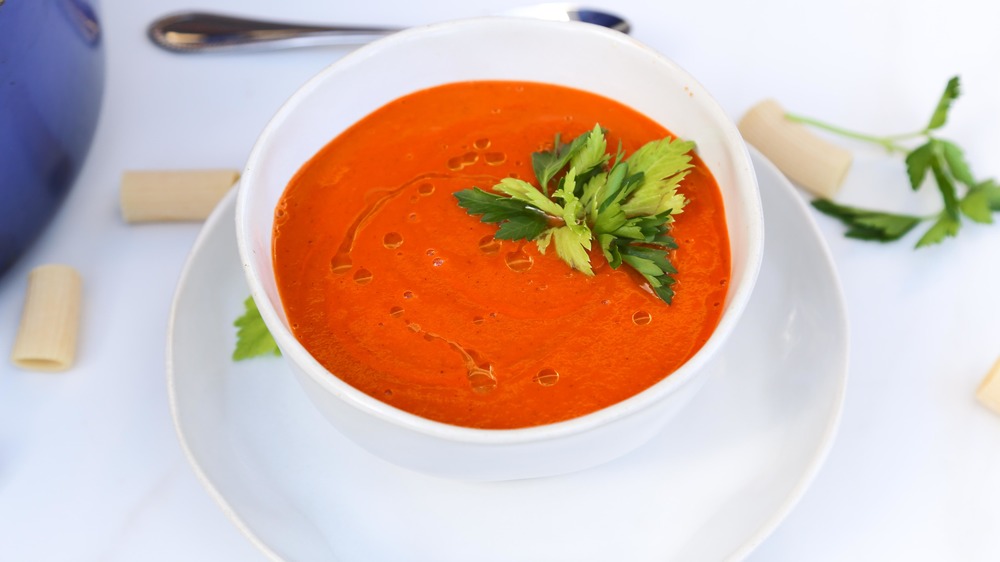
Ingredients
- 3 tablespoons olive oil
- 2 white onions, large dice
- ½ teaspoon sea salt
- 2 garlic cloves, minced
- 2 bay leaves
- 1 tablespoon cumin
- 1 pinch chili pepper flakes
- 2 32-oz cans fire-roasted tomatoes
- 4 cups vegetable stock
- 1 tablespoon butter, divided
Directions
- Heat oil in a large Dutch oven over medium low heat.
- Add onions and salt. Sauté until translucent (about 7 minutes), stirring often to keep them from burning.
- Add garlic, bay leaves, cumin, and chili pepper flakes. Sauté another 1 minute.
- Add the tomatoes and cook for another 5 minutes.
- Add the veggie stock and bring to a boil. Once boiling, reduce the soup to a simmer and cook partially covered for 15 minutes.
- Remove the bay leaves. Add cold butter to the soup then immediately blend in a high speed blender.
- Adjust seasoning and enjoy.
Nutrition
| Calories per Serving | 152 |
| Total Fat | 9.8 g |
| Saturated Fat | 2.3 g |
| Trans Fat | 0.1 g |
| Cholesterol | 5.1 mg |
| Total Carbohydrates | 16.3 g |
| Dietary Fiber | 6.8 g |
| Total Sugars | 9.9 g |
| Sodium | 532.8 mg |
| Protein | 3.3 g |
